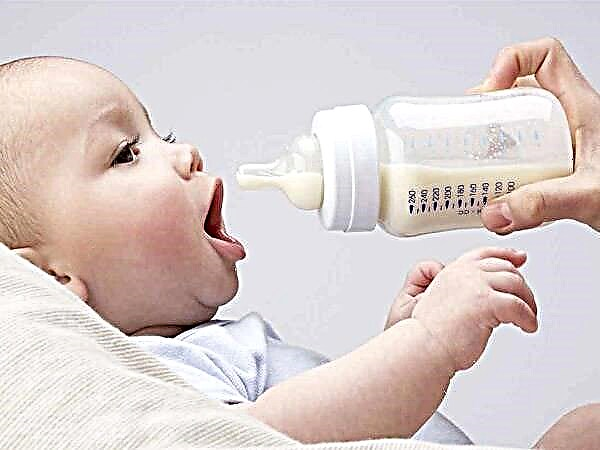
Attacks of nocturnal coughing torment the child and interfere with sleep both for him and his parents. When a baby wakes up at night and coughs badly for a long time, it is impossible to remain calm and wants to help the baby as soon as possible. But for this it is necessary to understand why the cough appears at night and how it is treated.

Causes
Cough acts as a protective function designed to rid a person of excess phlegm, bacteria or foreign bodies in the respiratory system. If the baby coughs during the day, as a rule, at night this symptom intensifies, because in the supine position less oxygen enters the lungs, and sputum accumulates.
The main causes of dry cough at night are:
- Consequences of colds and SARS. A cough with such diseases can last long enough, especially if they are not treated.
- Allergy. This cough often appears suddenly and is not accompanied by any other symptoms. Parents may associate it with allergen exposure, such as the flowering season or new household chemicals.
- Whooping cough. An agonizing cough at night with whistling, facial flushing and vomiting is a characteristic symptom of this disease.
- Bronchial asthma. Coughing fits with such an illness can torment a child closer to the morning.
- Chronic inflammation of the nasal mucosa or paranasal sinuses. With this type of runny nose or sinusitis, the child is often worried about a prolonged dry cough at night.
- Chronic pharyngitis. Nocturnal cough with this disease is not the only symptom. The child will also complain of severe sore throat.
- Gastric reflux. Such a reflex cough is caused by the contents of the stomach entering the esophagus, so it will also have heartburn.
- Teething. For this reason, a child may cough at night due to excess saliva flow.
- The air in the room is too dry. This situation is especially typical for the heating season. When the air is too dry, it irritates the respiratory tract, resulting in a dry cough.
- Helminthiasis. A cough can appear when infected with those worms, the larvae of which migrate through the lungs.

Cough without fever
The absence of an elevated temperature with nocturnal coughing fits may indicate the allergic nature of this symptom. In this case, the child may often have symptoms such as a runny nose, sore throat and itching, tearfulness and redness of the mucous membrane of the eyes. As a rule, bouts of dry allergic cough appear due to the presence of an allergen nearby, for example, due to new detergent powder with which mother washed the bedding or curtains, due to a down pillow, or due to flying pollen entering the nursery from open window.

How to help with a coughing fit?
First of all, a child with a coughing attack should be reassured, since many babies under 5 years old with such nocturnal attacks develop strong fear. Also, if a cough occurs at night, the child should be given a warm drink, for example, tea with honey or raspberries. A good effect is the use of alkaline mineral water, from which gas is released, before bed. Another popular recipe that has been shown to be effective for dry coughs is warmed milk with a little honey and baking soda.
It is also important to humidify and ventilate the room. Sometimes, to eliminate a dry nocturnal cough, it is enough to change the position of the child in a dream - turn him on his side or put a high pillow. If the dry cough recurs and is not eliminated by such measures, be sure to go to the doctor with your child.

Treatment
In the treatment of dry nocturnal cough, it is important to determine the cause of the symptom, since the treatment will be different in each case. If the cough is allergic, it is important to eliminate the allergen and consult a doctor who will select the appropriate antihistamine. If the cause of the cough is a bacterial infection, the child will need to be given antibiotics, which the pediatrician will prescribe.

Medication Review
Drugs used for coughing at night can affect:
- Cough center in the brain. They block the reflex itself.
- The muscles of the bronchi. These drugs dilate the bronchi and make breathing easier.
- The mucous membranes of the bronchi. Such medicines moisturize them, relieve inflammation and promote phlegm production.
- Sputum in the bronchi. These drugs make the mucus thinner, which helps to cough it up.
A pediatrician should prescribe such medications, since with the wrong choice of drug, in many cases they can further worsen the child's condition, and some drugs are not combined with each other.

Komarovsky's opinion
A popular doctor calls cough a protective symptom and calls for treating not it, but the disease that manifests itself in this way. Komarovsky is sure that fresh air and a lot of drink are of great importance in getting rid of dry coughs. With such simple measures, a well-known pediatrician recommends treating coughs to all parents, assuring that the use of drugs has the same effectiveness.
For more information, see Dr. Komarovsky's program about coughing.
Tips
- Do not ignore the attacks of nocturnal cough in the child. In some cases, this may be a symptom of diseases that need to be treated very urgently. If the cough persists for several nights in a row, be sure to see a doctor.
- You should not buy or give your child cough suppressants without consulting a pediatrician, especially antitussives with central action and antibiotics. They may be contraindicated for your child or simply not helpful.
- Do not forget about the need for a plentiful warm drink for the child, which will soften the throat and moisturize the mucous membranes. Give the baby tea, milk, herbal decoctions.
- Inhalation is often used to moisturize the mucous membranes with a dry cough, but parents should remember that immediately after the procedure, the cough, as a rule, intensifies. In addition, there are age restrictions for their implementation.
- Try tucking your child into bed with the pillow high. This technique will help get rid of a nocturnal cough caused by profuse drooling or a runny nose.
- To make it easier for your baby to breathe through the nose, clean it before bed. To do this, you can use a saline solution by dropping 2-3 drops into each nostril.
Diet therapy
Many parents find that changing their child's diet can help relieve a nocturnal cough.
It is recommended to include in the children's menu:
- Fresh juices, vegetables, berries and fruits, which are high in vitamin C.
- Hercules porridge with vegetable oil.
- Mashed potatoes with added milk.
- Radish salad with sour cream.
- Grapes with honey.

Prevention
- Monitor the temperature and humidity in the nursery. It is important to ventilate the room regularly, and humidify the air if necessary.
- If you are prone to allergies, it is important to prevent contact with possible allergens, for example, thoroughly remove dust or replace down pillows with hypoallergenic ones.



